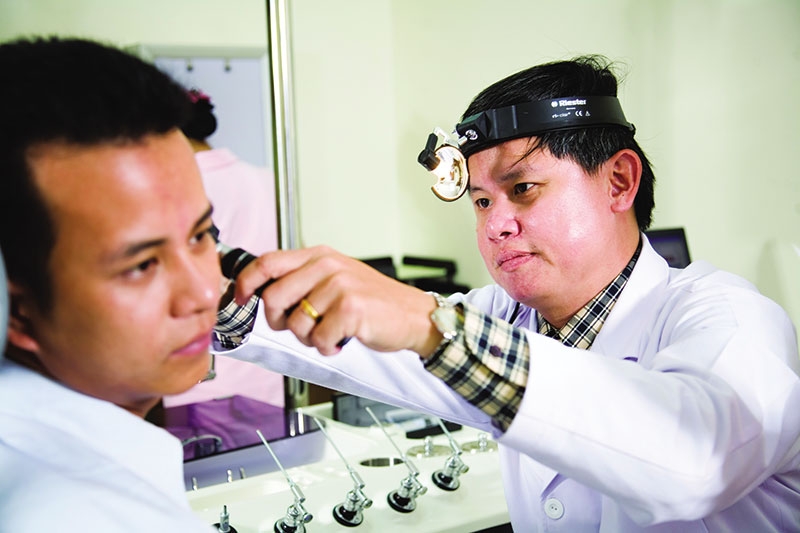MoH looks at PPP model for healthcare investors
 |
| MoH is eyeing communal clinics as a priority area to attract foreign private investment, Photo: Le Toan |
The Ministry of Health (MoH) is working on a circular to guide the development of public-private partnership (PPP) projects following the issuance of Decree No.63/2018/ND-CP governing investment in the PPP format, which came into effect on June 19, 2018.
“Private investment in the healthcare industry remains modest. It’s necessary to have a favourable business environment to promote the development of the private sector, thus creating a foundation for the PPP model in the future,” said an MoH senior official.
“We are also working on the amendment of Decree No.85/2012/ND-CP on the operation and financial mechanism of publicly run medical units towards promoting more private investment,” the official added.
These are considered strong signals by MoH, showing the positive change in its investment attraction strategy with more focus on the private sector. At present, Vietnam’s healthcare system is mostly publicly invested, while the privately run segment makes up only 5 per cent.
The signal was reinforced when Minister of Health Nguyen Thi Kim Tien made a call for private investment, including through the PPP format, at an online conference held in early July, naming upgrading communal clinics to increase their examination and basic treatment quality and thus easing the overload of central hospitals as a priority area.
The call comes as communal clinics have been invested in by the state for years, but their infrastructure fails to meet the growing demand.
For years, PPP has attracted interest from foreign investors in different sectors, including the healthcare industry, which boasts about 800 foreign firms.
The Vietnam Business Forum (VBF) Healthcare Working Group has encouraged the Vietnamese government to create a clear sector development roadmap led by a senior inter-ministerial taskforce. This roadmap should include an effective plan for various PPP projects, especially in enhancing the development of private clinics and hospitals, to take full advantage of support from the private sector.
“International healthcare companies, with international best practices and technical know-how, can help make a difference and create value and growth in Vietnam through PPP projects in research, innovative solutions, manufacturing, and technology transfers,” said Ngo Van Huy, representative of the VBF Healthcare Working Group.
According to the European Chamber of Commerce in Vietnam’s Pharma Group, members of which include Merck KGAA, Pfizer, Hoffman-La Roche Ltd., and Sanofi-Aventis Vietnam, the local pharmaceutical industry will be able to increase its capabilities through partnerships with multinational corporations, expand their product portfolio to contain more valued-added medicines, and use technological know-how to produce export-quality medicines.
Along with these moves and some never-before-seen highlights in Decree 63 related to investment capital, investment incentives (import duty, corporate income tax, land use levy/rental, loans), guarantees, and dispute settlement, domestic and foreign firms can expect more opportunities to join PPP projects in the industry.
Vietnam’s pharmaceutical market has emerged as increasingly appealing to foreign investors, given the growing demand for high-quality and accessible healthcare services. In addition, the enforcement of several free trade agreements (FTAs), including the EU-Vietnam FTA, should further open the market.
The market is on track to grow quite strongly in the near future. In 2017, the revenue of the market was estimated at $5.2 billion, up about 10 per cent on-year, and it is expected to continue seeing double-digit growth rates over the next five years, according to London-based Business Monitor International.
What the stars mean:
★ Poor ★ ★ Promising ★★★ Good ★★★★ Very good ★★★★★ Exceptional
 Tag:
Tag:
Related Contents
Latest News
More News
- US firms deepen energy engagement with Vietnam (February 05, 2026 | 17:23)
- Vietnam records solid FDI performance in January (February 05, 2026 | 17:11)
- Site clearance work launched for Dung Quat refinery upgrade (February 04, 2026 | 18:06)
- Masan High-Tech Materials reports profit: a view from Nui Phao mine (February 04, 2026 | 16:13)
- Hermes joins Long Thanh cargo terminal development (February 04, 2026 | 15:59)
- SCG enhances production and distribution in Vietnam (February 04, 2026 | 08:00)
- UNIVACCO strengthens Asia expansion with Vietnam facility (February 03, 2026 | 08:00)
- Cai Mep Ha Port project wins approval with $1.95bn investment (February 02, 2026 | 16:17)
- Repositioning Vietnam in Asia’s manufacturing race (February 02, 2026 | 16:00)
- Manufacturing growth remains solid in early 2026 (February 02, 2026 | 15:28)





















 Mobile Version
Mobile Version